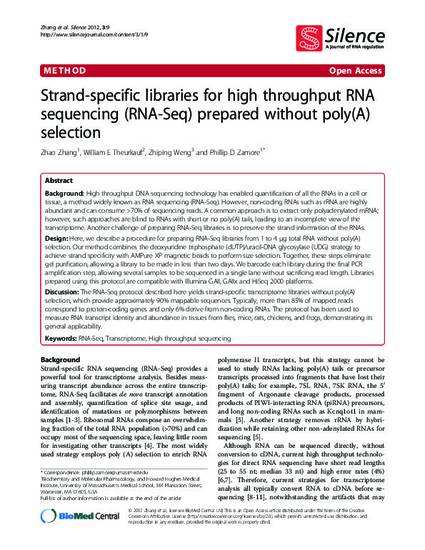
BACKGROUND: High throughput DNA sequencing technology has enabled quantification of all the RNAs in a cell or tissue, a method widely known as RNA sequencing (RNA-Seq). However, non-coding RNAs such as rRNA are highly abundant and can consume >70% of sequencing reads. A common approach is to extract only polyadenylated mRNA; however, such approaches are blind to RNAs with short or no poly(A) tails, leading to an incomplete view of the transcriptome. Another challenge of preparing RNA-Seq libraries is to preserve the strand information of the RNAs.
DESIGN: Here, we describe a procedure for preparing RNA-Seq libraries from 1 to 4 mug total RNA without poly(A) selection. Our method combines the deoxyuridine triphosphate (dUTP)/uracil-DNA glycosylase (UDG) strategy to achieve strand specificity with AMPure XP magnetic beads to perform size selection. Together, these steps eliminate gel purification, allowing a library to be made in less than two days. We barcode each library during the final PCR amplification step, allowing several samples to be sequenced in a single lane without sacrificing read length. Libraries prepared using this protocol are compatible with Illumina GAII, GAIIx and HiSeq 2000 platforms.
DISCUSSION: The RNA-Seq protocol described here yields strand-specific transcriptome libraries without poly(A) selection, which provide approximately 90% mappable sequences. Typically, more than 85% of mapped reads correspond to protein-coding genes and only 6% derive from non-coding RNAs. The protocol has been used to measure RNA transcript identity and abundance in tissues from flies, mice, rats, chickens, and frogs, demonstrating its general applicability.
Available at: http://works.bepress.com/zhao-zhang/4/

Author Zhao Zhang is a student in the Interdisciplinary Graduate Program in the Graduate School of Biomedical Sciences (GSBS) at UMass Medical School.